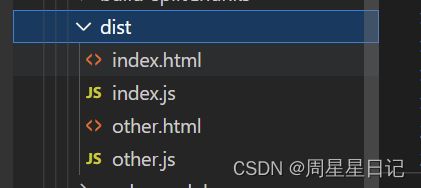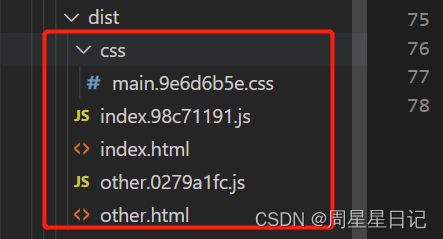03.webpack中hash,chunkhash和contenthash 的区别
-
hash、contenthash 和 chunkhash 是通过散列函数处理之后,生成的一串字符,可用于区分文件。
作用:善用文件的哈希值,解决浏览器缓存导致的资源未及时更新的问题1.文件名不带哈希值
const path = require('path')
const HtmlWebpackPlugin = require('html-webpack-plugin')
const { srcPath, distPath } = require('./paths')
module.exports = {
entry: {
index: path.join(srcPath, 'index.js'),
other: path.join(srcPath, 'other.js')
},
module: {
rules: [
]
},
plugins: [
// 多入口 - 生成 index.html
new HtmlWebpackPlugin({
template: path.join(srcPath, 'index.html'),
filename: 'index.html',
// chunks 表示该页面要引用哪些 chunk (即上面的 index 和 other),默认全部引用
chunks: ['index'] // 只引用 index.js
}),
// 多入口 - 生成 other.html
new HtmlWebpackPlugin({
template: path.join(srcPath, 'other.html'),
filename: 'other.html',
chunks: ['other'] // 只引用 other.js
})
]
}
2. 问题所在
每一次编译后,生成的文件名都一样,这样会存在一个问题,通过 webpack 编译生成的静态文件会被我们放置到服务器中,当编译后的文件更新时,由于浏览器或者服务器设置的缓存策略,同名文件可能不会立刻被更新,导致用户访问到的仍然是上一次的版本。
3.hash
为了解决这个问题,我们通常会在文件名上加一些哈希值,保证当更新文件时,浏览器会重新下载资源。这里使用 hash这个占位符
const path = require('path')
const webpack = require('webpack')
const { CleanWebpackPlugin } = require('clean-webpack-plugin')
const webpackCommonConf = require('./webpack.common.js')
const { smart } = require('webpack-merge')
const { srcPath, distPath } = require('./paths')
module.exports = smart(webpackCommonConf, {
mode: 'production',
output: {
// filename: 'bundle.[contentHash:8].js', // 打包代码时,加上 hash 戳
filename: '[name].[contentHash:8].js', // name 即多入口时 entry 的 key
path: distPath,
// publicPath: 'http://cdn.abc.com' // 修改所有静态文件 url 的前缀(如 cdn 域名),这里暂时用不到
},
module: {
rules: [
]
},
plugins: [
new CleanWebpackPlugin(), // 会默认清空 output.path 文件夹
new webpack.DefinePlugin({
// window.ENV = 'production'
ENV: JSON.stringify('production')
})
]
})
- 打包出来如下,带上hash值

- 当项目里没有文件发生改变时,无论如何重新编译,文件哈希值都不会变。但此时,改变了
index.js文件,增加一句输出,所有文件的哈希值都会同时改变。 - 所存在的问题: 所有文件的哈希值都发生了变化,
导致即使只更新了一个文件都需要重新加载所有资源,还是有些浪费性能的
4.chunkhash
这里是多入口的项目,只改变了 index.js这个入口,不希望 other.js入口的文件也被修改,就可以使用占位符 chunkhash来解决,另外哈希值比较长,截取八位显示。
module.exports = {
// 部分配置省略
output: {
// filename: 'bundle.[contentHash:8].js', // 打包代码时,加上 hash 戳
filename: '[name].[chunkhash:8].js', // name 即多入口时 entry 的 key
path: distPath,
// publicPath: 'http://cdn.abc.com' // 修改所有静态文件 url 的前缀(如 cdn 域名),这里暂时用不到
},
plugins: [
],
};
- 可以看到同一个 chunk 打包出来的哈希值是一样的,在同一个入口中的hash是一样的

- 当修改了 css 文件时,只有同 chunk 的 main.js 和 main.css 文件的哈希值发生了改变,
- css 文件是在 main.js这个 chunk 的,但 other.js本身没有发生任何修改,可以不用重新加载
5.contenthash
同一个 chunk 中,部分文件修改导致所有文件的哈希值发生变化的问题,可以使用 contenthash 来解决,contenthash 只和每一个文件的内容有关,内容发生变化,则重新生成哈希值

module.exports = {
// 部分配置省略
output: {
filename: '[name]_[contenthash:8].js',
path: path.resolve(__dirname, "./dist"),
},
plugins: [
new MiniCssExtractPlugin({
filename: './[name]_[contenthash:8].css',
}),
],
};
总结
在 webpack 中有三种生成哈希值规则的方式,可以用来区分文件是否修改。
hash 与整个项目有关,项目里有文件修改,所有文件的哈希值都会变化。chunkhash 与入口有关,同一入口的文件被视为一个整体,当其中一个文件修改时,同入口的所有文件哈希值发生改变。contenthash 只与文件内容有关,文件内容发生改变,才会更改该文件的哈希值。


